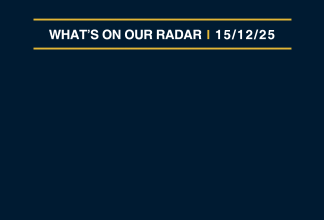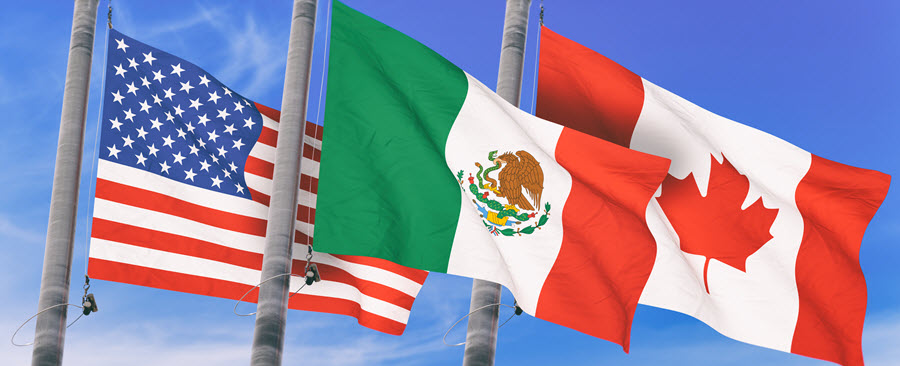What Does the U.S.-Mexico Trade Deal Mean for Canada?
Written by The Content Team
Published on August 30, 2018
minute read
Share:
When U.S. President Trump announced a preliminary trade deal with Mexico recently, he also suggested that the North American Free Trade Agreement (NAFTA) could be scrapped and replaced with a bilateral agreement that would exclude Canada. He went so far as to suggest renaming the agreement the United States-Mexico Trade Agreement. After roughly a year of intensive negotiations, where does this leave Canada and the future of NAFTA?
"This now puts Canada in the hot seat," says Eric Lascelles, Chief Economist at RBC Global Asset Management. "The White House will attempt to cajole Canada into hastily signing onto the U.S.-Mexican deal under the threat of being excluded altogether," he said in his latest weekly economic update.
The Breakthrough Deal
According to early media reports, the preliminary agreement with Mexico, which still requires congressional approval in the U.S., resolved the negotiation impasse with the following key changes:
- A minimum of 75 per cent of the parts in any car sold in North America must be manufactured in the U.S. or Mexico. (This is up from the current 62.5 per cent of parts that must be produced in either Canada, Mexico or the U.S.)
- Between 40 and 45 per cent of auto parts in cars sold in North America must be manufactured by employees making at least US$16 per hour
- The agreement will last for 16 years, but will be reviewed every six years
Is Canada In or Out?
The U.S. chief negotiator, Robert Lighthizer, indicated that he'd like Canada to sign on to the deal by August 31. This could be viewed as a pressure tactic and according to Lascelles, "would appear to be an unreasonable timeline given that the U.S. and Mexico just spent many weeks in negotiations." While some of the items may already be settled to Canada's satisfaction, Lascelles notes that other aspects of the new deal may be unacceptable to Canada, resulting in significant negotiations still required.
Canadian Foreign Affairs Minister Chrystia Freeland left for Washington after the Mexico plan was announced, to resume talks. "We will, as we have done throughout this negotiation, stand up for the Canadian national interest and for Canadian values while looking for areas where we can find a compromise," she told the media before heading into negotiations. Discussions resumed the following day and Freeland said they were "constructive" and would continue.
Despite the recent breakthrough with Mexico and ongoing posturing from all sides, Lascelles and the economics team at RBC Global Asset Management still believe that Canada will be a part of a new NAFTA agreement. "Our base-case scenario remains that Canada will ultimately be included in any new deal," says Lascelles. "The country will likely have to make some concessions – perhaps lowering barriers for the dairy sector and being more flexible about sunset clauses and dispute resolution mechanisms – but can more likely than not find a way to get a deal done."
Win, Lose or Compromise
There are a number of scenarios that could play out, depending on how the negotiators handle the various sticking points and when they choose to dig their heels in. Lascelles's team sees a roughly 60% chance that a new NAFTA deal will arise – giving 45% odds of a "compromise" that sees the current NAFTA deal "weakened, but still functional" and 15% odds that the U.S. will "win" and NAFTA is "defanged" with additional protectionist clauses.
RBC Direct Investing Inc., RBC Global Asset Management Inc. and Royal Bank of Canada are separate corporate entities which are affiliated. RBC Direct Investing Inc. is a wholly owned subsidiary of Royal Bank of Canada and is a Member of the Investment Industry Regulatory Organization of Canada and the Canadian Investor Protection Fund. Royal Bank of Canada and certain of its issuers are related to RBC Direct Investing Inc. RBC Direct Investing Inc. does not provide investment advice or recommendations regarding the purchase or sale of any securities. Investors are responsible for their own investment decisions. RBC Direct Investing is a business name used by RBC Direct Investing Inc. ® / ™ Trademark(s) of Royal Bank of Canada. RBC and Royal Bank are registered trademarks of Royal Bank of Canada. Used under licence. © Royal Bank of Canada 2018. All rights reserved.
The views and opinions expressed in this publication are for your general interest and do not necessarily reflect the views and opinions of RBC Direct Investing. Furthermore, the products, services and securities referred to in this publication are only available in Canada and other jurisdictions where they may be legally offered for sale. If you are not currently resident of Canada, you should not access the information available on the RBC Direct Investing website.
Explore More

7 Ways to Get Ahead Financially in 2026
How you might invigorate your finances and put your money to work more intentionally this year
minute read

Economic Outlook: Uncertainty is Here to Stay, So What's Next?
Takeaways from the Economic Club of Canada’s Annual Event
minute read

3 things: Week of December 15
What the Inspired Investor team is watching this week
minute read
Inspired Investor brings you personal stories, timely information and expert insights to empower your investment decisions. Visit About Us to find out more.







